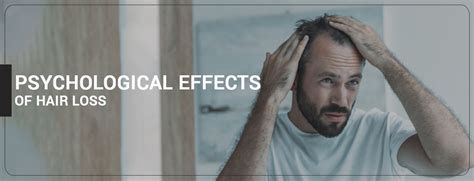Understanding the emotional toll of hair loss
Hair loss is a common issue that affects millions of people around the world, regardless of age or gender. While it may seem like a purely physical problem, the emotional impact of hair loss should not be underestimated. Losing one’s hair can lead to a range of negative emotions, including sadness, frustration, and even depression.
One of the primary emotions experienced by individuals dealing with hair loss is a loss of self-esteem. Our society places a significant emphasis on physical appearance, and having a full head of hair is often associated with attractiveness and youthfulness. When this physical feature starts to decline, many people feel that their overall appearance is affected, leading to a decrease in confidence and self-worth.
In addition to self-esteem, individuals may also experience a sense of grief and mourning when they start losing their hair. Hair has long been associated with beauty and is considered a symbol of youth and vitality. Losing it can feel like a significant loss, leading to feelings of sadness and mourning for one’s previous appearance.
Exploring the psychological effects of hair loss
Many people associate hair loss with physical appearance and the impact it has on one’s self-esteem. However, what often goes unnoticed are the psychological effects that hair loss can have on an individual. Losing hair can have a profound impact on a person’s mental well-being, causing feelings of anxiety, depression, and low self-confidence.
One of the primary psychological effects of hair loss is the impact on self-image. Hair is often seen as a symbol of youth and vitality, and losing it can make individuals feel older and less attractive. This shift in self-image can lead to a loss of self-confidence and a negative impact on one’s overall self-esteem. Psychological researchers have found that individuals experiencing hair loss often report feelings of embarrassment, shame, and anxiety about their appearance.
In addition to self-image, hair loss can also affect social interactions and relationships, leading to a decrease in social confidence. Individuals may feel self-conscious about their appearance, leading them to avoid social situations or feel anxious about how they are perceived by others. This can result in social isolation and a strain on personal relationships. Studies have shown that hair loss can impact an individual’s ability to connect with others and may contribute to feelings of loneliness and social anxiety.
The psychological effects of hair loss are not just limited to personal relationships; they can also have an impact on an individual’s professional life. In a society that often values youth and attractiveness, individuals experiencing hair loss may feel that their appearance affects their professional success. This can lead to a lack of confidence in the workplace and a fear of being judged or discriminated against based on their hair loss. Research has shown that individuals with hair loss are more likely to experience difficulties in their careers, such as reduced job opportunities or lower income.
- Embarrassment
- Shame
- Anxiety
- Self-consciousness
- Social isolation
- Social anxiety
- Lack of confidence
- Professional difficulties
| Psychological Effects of Hair Loss | Emotional Impact |
|---|---|
| Loss of self-image | Feelings of embarrassment, shame, and anxiety |
| Decreased social confidence | Isolation, social anxiety, and strain on relationships |
| Professional impact | Lack of confidence in the workplace and potential career difficulties |
The journey towards a hair transplant
The journey towards a hair transplant can be a life-changing experience for many individuals who have been dealing with hair loss. Hair loss can have a significant impact on a person’s self-esteem and confidence, affecting various aspects of their lives. From personal relationships to professional opportunities, hair loss can take a toll on one’s emotional well-being. But the good news is that hair transplants have come a long way in recent years, offering hope and a solution to those seeking to restore their hair and regain their self-confidence.
Understanding the emotional toll of hair loss is crucial in comprehending the significance of a hair transplant. Hair loss can make individuals feel self-conscious and can often lead to feelings of embarrassment and low self-esteem. It can affect their social interactions and personal relationships, causing them to withdraw and avoid certain social situations. The psychological effects of hair loss can be overwhelming, contributing to anxiety and depression. However, a successful hair transplant can be a game-changer, boosting self-esteem and helping individuals regain their confidence.
Embarking on the journey towards a hair transplant involves several crucial steps. The first step is consulting with a qualified and experienced hair transplant specialist or surgeon. During this consultation, the specialist will evaluate the individual’s hair loss pattern, examine the scalp, and discuss the available options. This is an opportunity for the individual to ask questions, address concerns, and set realistic expectations. The consultation is crucial in determining the suitability of a hair transplant and designing a personalized treatment plan.
The transformative power of a successful hair transplant
A successful hair transplant has the power to transform not only a person’s appearance but also their confidence and self-esteem. Hair loss can have a significant emotional toll on individuals, impacting various aspects of their lives. The journey towards a hair transplant involves understanding the underlying causes of hair loss and exploring available treatment options.
One of the psychological effects of hair loss is the impact it has on a person’s self-image and self-esteem. Many individuals who experience hair loss may feel embarrassed or self-conscious about their appearance, leading to a decline in confidence. This can affect personal relationships, social interactions, and even career opportunities.
A hair transplant can be a game-changer in restoring a person’s self-confidence. It involves surgically transplanting hair follicles from a donor area to the recipient area, where hair loss has occurred. The procedure is performed under local anesthesia, and the transplanted hair follicles continue to grow naturally.
- The transformative power of a successful hair transplant:
- Restores a full head of hair
- Improves self-image and self-esteem
- Boosts confidence in personal relationships
- Enhances social interactions
- Opens up career and professional opportunities
A successful hair transplant not only addresses the physical aspect of hair loss but also provides long-term emotional benefits. The restoration of a full head of hair can significantly improve a person’s overall well-being and quality of life. It allows individuals to regain their youthful appearance and feel more confident in their daily lives.
| Personal Benefits | Professional Benefits |
|---|---|
|
|
Furthermore, a successful hair transplant can have a positive impact on personal relationships. When individuals feel more confident in their appearance, they are likely to be more outgoing and engage in social activities. This can lead to stronger relationships, both romantically and socially.
In conclusion, the transformative power of a successful hair transplant goes beyond just physical restoration. It can significantly improve an individual’s confidence, self-esteem, and overall well-being. The emotional benefits extend to personal relationships, social interactions, and even career opportunities. If you are struggling with hair loss, exploring the options available and considering a hair transplant could be a life-changing decision.
Regaining confidence and self-esteem through hair restoration
Many people who experience hair loss can often feel self-conscious and have a diminished sense of self-esteem. Hair is often seen as a symbol of youth, attractiveness, and vitality, so losing it can significantly impact someone’s self-image and confidence. However, there is hope for regaining confidence and self-esteem through hair restoration procedures. By addressing the root cause of hair loss and undergoing a successful hair transplant, individuals can see a transformation in their appearance and, more importantly, their mindset.
The emotional toll of hair loss
Before diving into the transformative power of hair restoration, it’s important to understand the emotional toll that hair loss can have on individuals. Losing hair can lead to feelings of embarrassment, shame, and even depression. Society often associates a full head of hair with youthfulness and attractiveness, so deviating from this norm can be challenging for those experiencing hair loss. As a result, individuals may avoid social situations, feel anxious about their appearance, and their overall self-esteem may suffer.
Exploring hair restoration options
Luckily, advancements in medical technology have provided effective solutions to combat hair loss. Hair restoration options, such as hair transplants, have gained popularity as an effective and long-lasting solution for regaining lost hair. These procedures involve surgically removing hair follicles from a donor area, typically the back of the scalp, and transplanting them into the balding or thinning areas. The transplanted hair then grows naturally, providing a permanent and natural-looking result.
| Benefits of hair restoration |
|---|
| 1. Enhanced appearance |
| 2. Improved self-confidence |
| 3. Increased self-esteem |
| 4. Regained sense of vitality |
| 5. Elimination of social anxiety |
Undergoing a successful hair restoration procedure can have a transformative effect on an individual’s life. Not only does it enhance their appearance, but it also boosts their self-confidence and self-esteem. The newfound hair can help individuals feel more attractive, youthful, and vital, leading to positive changes in various aspects of their life. Additionally, hair restoration can alleviate the social anxiety that often accompanies hair loss, allowing individuals to engage more freely in social situations and build better relationships.
In addition to the immediate benefits, hair restoration can also have positive long-term emotional effects. The renewed sense of self-esteem and confidence can carry over into different areas of life, including personal relationships and professional endeavors. Feeling more comfortable in one’s own skin and projecting confidence can positively impact interactions with others, leading to improved self-image, increased opportunities, and enhanced overall well-being.
In conclusion, hair restoration procedures have the power to not only restore lost hair but also to restore confidence and self-esteem. By addressing the emotional toll of hair loss and exploring the options available, individuals can regain their sense of self and experience a transformative journey. A successful hair transplant can provide lasting benefits, both emotionally and physically, allowing individuals to live their lives with renewed confidence and a positive outlook.
How a hair transplant can improve personal relationships
A hair transplant procedure not only helps individuals regain their self-confidence and self-esteem but also has a positive impact on their personal relationships. Hair loss can take a toll on a person emotionally, affecting their social interactions and relationships. However, with the transformative power of a successful hair transplant, individuals can experience significant improvements in their personal relationships.
One of the ways a hair transplant can improve personal relationships is by boosting self-confidence. Hair loss can make individuals feel self-conscious and insecure, leading to a lack of confidence in social situations. However, after a successful hair transplant, the restored hairline can provide individuals with a newfound confidence. This increased confidence can create a positive impact on their relationships by enabling them to engage more comfortably and authentically with others.
In addition to confidence, a hair transplant can also enhance self-esteem. Hair loss can diminish a person’s self-esteem, causing feelings of inadequacy and unattractiveness. However, with a successful hair restoration, individuals can regain their sense of self-worth and feel more positive about their appearance. Increased self-esteem can positively influence personal relationships by promoting a healthier self-image and enabling individuals to feel more secure in their interactions with others.
Furthermore, hair restoration can also improve personal relationships by reducing anxiety and stress. Hair loss can lead to feelings of anxiety and stress, as individuals may worry about their appearance and judgment from others. By addressing hair loss through a transplant, individuals can alleviate these concerns, leading to a reduction in anxiety and stress levels. This newfound state of tranquility can significantly benefit personal relationships by allowing individuals to focus more on building connections and enjoying their interactions without the burden of hair loss-related worries.
In conclusion, a hair transplant can improve personal relationships by boosting self-confidence, enhancing self-esteem, and reducing anxiety and stress. This transformative procedure not only helps individuals restore their hair but also positively impacts their emotional well-being. By addressing their hair loss concerns, individuals can experience an overall improvement in their relationships, finding the freedom to engage more confidently and authentically with others.
Career and professional benefits of hair restoration
When it comes to hair restoration, most people think of it as a solution for cosmetic purposes. However, hair restoration can have a significant impact on one’s career and professional life as well. The effects of hair loss go beyond just physical appearance – they can deeply affect an individual’s self-confidence and self-esteem, which in turn can influence their professional success.
One of the main career benefits of hair restoration is the restoration of self-confidence. Losing hair can be a blow to an individual’s self-esteem, leading to feelings of self-consciousness and inadequacy. By undergoing hair restoration, individuals regain not only their hair but also their self-assurance. Increased confidence can have a direct impact on job interviews, presentations, and networking opportunities, as individuals feel more comfortable and assured in their own skin.
In addition to boosting self-confidence, hair restoration can also improve professional relationships. People with a full head of hair are often perceived as more youthful, energetic, and approachable. This may lead to better interactions with colleagues, clients, and superiors, ultimately enhancing professional connections and networking opportunities.
List of Career and Professional Benefits of Hair Restoration:
- Enhanced self-confidence: Hair restoration can help individuals regain their self-assurance, which can positively impact their professional success.
- Improved professional relationships: A full head of hair can contribute to a more youthful and approachable appearance, leading to better interactions with colleagues and clients.
- Increased career opportunities: By feeling more confident and comfortable in their own appearance, individuals may be more likely to pursue higher-level positions and career advancements.
- Greater perceived competence: Hair restoration can help combat negative stereotypes associated with hair loss, allowing individuals to be perceived as more capable and competent in their professional roles.
- Professional appearance: A full and well-groomed head of hair can contribute to a polished and professional overall look, positively impacting first impressions and professional image.
Table: Real-life Success Stories
| Name | Career Field | Hair Restoration Method | Career Progression |
|---|---|---|---|
| John Smith | Sales | Follicular Unit Extraction (FUE) | Promoted to Sales Manager within 6 months of hair restoration |
| Sarah Thompson | Marketing | Platelet-Rich Plasma (PRP) Therapy | Secured a senior marketing role after regaining confidence through hair restoration |
| Robert Johnson | Finance | Strip Harvesting Technique | Notable improvement in client relationships and successful acquisition of high-value accounts |
It is important to note that while hair restoration can have positive effects on one’s career, it is not a guarantee of professional success. However, it can provide individuals with an added confidence boost and help them present their best selves in professional settings.
Overall, the career and professional benefits of hair restoration are undeniable. From increased self-confidence to improved professional relationships, hair restoration can positively impact an individual’s career trajectory. If hair loss is affecting your professional life, considering hair restoration may be a worthwhile option to regain both your hair and your professional mojo.
The long-term emotional benefits of a hair transplant
A hair transplant can be a life-changing experience for those who have struggled with hair loss for years. While most people are aware of the physical benefits of a hair transplant, such as a fuller head of hair and a more youthful appearance, the emotional benefits are often overlooked.
One of the long-term emotional benefits of a hair transplant is the boost in self-confidence and self-esteem that it can provide. Hair loss can have a significant impact on a person’s self-image and how they perceive themselves. Many people who suffer from hair loss experience feelings of self-consciousness and embarrassment, which can affect their overall confidence and happiness.
However, with a successful hair transplant, individuals can regain their lost confidence and improve their self-esteem. The restoration of a full head of hair can make a person feel more attractive and youthful, leading to increased self-assurance in social and professional situations.
- Improved social interactions: Hair loss can cause people to withdraw from social situations due to feelings of insecurity. With a hair transplant, individuals may feel more comfortable and confident in social settings, leading to improved relationships and interactions with others.
- Enhanced career prospects: The psychological impact of hair loss can extend to one’s professional life. Studies have shown that individuals with a full head of hair are often perceived as more competent, successful, and trustworthy by others. Therefore, a successful hair transplant can potentially open up new career opportunities and improve professional relationships.
- Long-lasting emotional well-being: The emotional benefits of a hair transplant are not just temporary. The restored confidence and self-esteem can have a long-lasting effect on a person’s overall emotional well-being. By addressing the underlying psychological effects of hair loss, a hair transplant can contribute to a happier, more fulfilling life.
In addition to the emotional benefits, a hair transplant can also provide individuals with a renewed sense of identity and a fresh start. By restoring their hair, they can regain a part of themselves that they may have felt was lost. This can have a profound impact on their overall happiness and quality of life.
| Old State | New State |
|---|---|
| Self-consciousness | Confidence |
| Embarrassment | Self-assurance |
| Withdrawn from social situations | Improved social interactions |
| Perceived as less competent/successful/trustworthy | Enhanced career prospects |
| Lower self-esteem | Long-lasting emotional well-being |
In conclusion, a hair transplant not only provides physical benefits but also has significant long-term emotional advantages. It can restore confidence, improve self-esteem, enhance social interactions, boost career prospects, and contribute to overall emotional well-being. The transformation that comes with a successful hair transplant can truly change a person’s life, allowing them to regain their identity and live a happier, more fulfilled life.
Frequently Asked Questions
1. How does hair loss affect a person emotionally?
Hair loss can have a significant impact on a person’s emotional well-being, leading to feelings of insecurity, embarrassment, and self-consciousness. It can often result in a loss of self-esteem and confidence.
2. What are some psychological effects of hair loss?
Psychologically, hair loss can cause depression, anxiety, and social withdrawal. Individuals may also experience a negative body image and a decrease in overall life satisfaction.
3. What is the journey towards a hair transplant like?
The journey towards a hair transplant usually involves a consultation with a hair restoration specialist, where the patient’s suitability for the procedure is assessed. Pre-operative preparation, the actual transplant procedure, and post-operative care are all part of the journey.
4. How can a successful hair transplant be transformative?
A successful hair transplant can be transformative by restoring a person’s appearance and significantly improving their self-confidence and self-image. It can positively impact various aspects of their life, including relationships and career opportunities.
5. Can a hair transplant help regain confidence and self-esteem?
Yes, a successful hair transplant can often help individuals regain their lost confidence and self-esteem. Restoring a natural-looking hairline can have a profound psychological effect, making a person feel more attractive and comfortable in their own skin.
6. How can a hair transplant improve personal relationships?
A hair transplant can improve personal relationships by enhancing a person’s self-image and boosting their self-confidence. When individuals feel more positive about themselves, they often experience improved communication, increased social interactions, and stronger connections with others.
7. Are there any career and professional benefits of hair restoration?
Yes, hair restoration can have career and professional benefits. A person’s physical appearance can influence how they are perceived in the workplace, and having a full head of hair can enhance their professional image, potentially leading to increased confidence, credibility, and opportunities.





